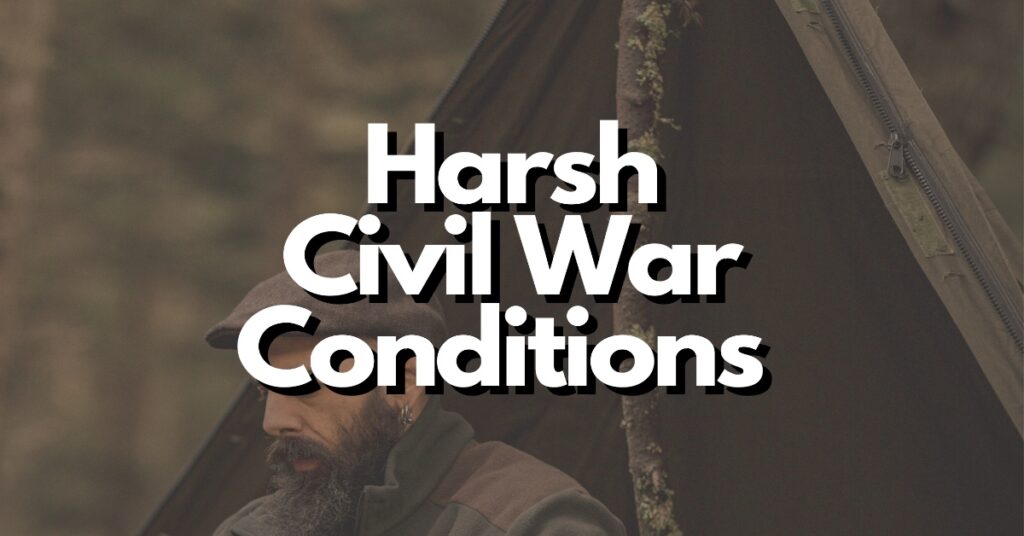The American Civil War, a defining chapter in the nation’s history, is often remembered for its battles and political ramifications. However, behind the frontlines, soldiers faced a different kind of battle – one against the harsh conditions of the environment, disease, and scarcity.
In this article, we delve into the untold stories of the physical and mental challenges soldiers confronted during the war, shedding light on the silent adversaries that took a heavy toll.
The Invisible Adversaries: Environment and Disease
While the battlefield claimed countless lives, soldiers encountered an even deadlier adversary: the environment and the diseases it harbored. The harsh living conditions and limited medical knowledge of the time exacerbated the impact of these unseen foes.
Disease Outbreaks: A Silent Killer
Crowded camps, lack of sanitation, and limited access to clean water created fertile ground for diseases like dysentery, typhoid fever, and measles to spread rapidly among soldiers. The absence of proper medical care often led to devastating outcomes.
Malnutrition and Starvation
Soldiers on both sides faced periods of extreme scarcity, with rations often insufficient to meet their nutritional needs. Malnutrition weakened immune systems, leaving soldiers vulnerable to diseases that might otherwise have been less severe.
Exposure to the Elements
Civil War soldiers faced the harsh realities of changing weather conditions without adequate protection. Frostbite, heatstroke, and pneumonia claimed lives as soldiers were exposed to extreme temperatures without proper clothing or shelter.
Mental and Emotional Strain
Beyond physical hardships, soldiers experienced immense mental and emotional strain. Prolonged separation from loved ones, constant threat of danger, and witnessing the horrors of war took a toll on their psychological well-being.
Forgotten Casualties: Non-Battle Deaths
The war’s grim statistics go beyond the battlefield; a significant portion of casualties occurred due to non-battle-related causes:
Medical Facilities and Care
Medical care during the Civil War often lagged behind the scale of need. Understaffed and ill-equipped hospitals struggled to provide adequate care, contributing to the high mortality rate among wounded soldiers.
Unsanitary Conditions
Unsanitary conditions in military camps and makeshift hospitals facilitated the rapid spread of infections, compounding the challenges of treating wounded soldiers.
Epidemics and Pandemics
Epidemics such as smallpox and cholera swept through camps and hospitals, devastating soldiers and those around them. The lack of understanding about disease transmission further exacerbated the situation.
Lessons Learned: Legacy of Struggle
The harsh conditions faced by Civil War soldiers were a grim testament to the challenges of warfare during that era. Their endurance and sacrifices paved the way for advances in medical science, sanitation practices, and the understanding of psychological trauma.
Advancements in Medicine
The Civil War marked a turning point in medical practices. Innovations like ambulances, mobile field hospitals, and triage systems emerged as a response to the immense medical challenges faced on the battlefield.
Humanitarian Efforts
The wartime experiences highlighted the importance of compassionate care. Organizations like the United States Sanitary Commission played a crucial role in providing aid and improving conditions for wounded soldiers.
An Everlasting Legacy
The legacy of the soldiers’ struggles continues to influence modern healthcare practices and the recognition of the importance of mental health in times of conflict.
Conclusion
As we reflect on the American Civil War, it’s imperative to remember the soldiers who faced not only the guns and cannons of battle but also the silent adversaries of disease, environment, and emotional turmoil. Their sacrifices and the lessons learned from their struggles have shaped the trajectory of medicine, warfare, and human compassion.
By acknowledging the challenges they endured, we pay tribute to the resilience of those who fought on an invisible battlefield, their contributions reverberating through generations to come.
